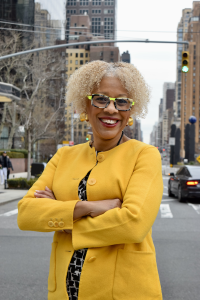
Dr. Michelle Ferrier, Board President
Former JTM Board President
Executive Director, Media Innovation Collaboratory
Founder, Troll-Busters.com
Researcher/Author/Educator/Creator
Former Deans of Journalism Schools
Michelle Ferrier, Ph.D. currently serves as president of the International Association of Women in Radio & Television. She is the executive director of the Media Innovation Collaboratory and an internationally-recognized, award-winning technologist, journalist, and scholar in digital journalism, technology, media innovation, diversity and entrepreneurship.
Michelle Ferrier, Ph.D., is executive director of the Media Innovation Collaboratory, an incubator for media and technology communication solutions. She is the founder of TrollBusters, an educational service for journalists experiencing digital harms. Her pioneering research mapping media deserts and monitoring and modeling digital harms has won her grant support from organizations like the Knight Foundation, Democracy Fund, and others. Dr. Ferrier has won international, national and professional recognition including six Anthem Awards for innovation and social impact work, six 2022 and 2023 international digital innovation Anthem Awards, the 2019 Association of Educators of Journalism and Mass Communication Professional Freedom and Responsibility Award, and the Dewey Community Service Award from SXSW. Named a 2018 Top 10 Educators to Watch by MediaShift, Dr. Ferrier has led hundreds of presentations on engaged journalism and digital technologies and developed curricula in digital media, media innovation and entrepreneurship, and online journalism and collaborated with international organizations like the United Nations, OSCE, Article 19, and other professional organizations to ensure global press freedoms.
From Michelle:
“I first encountered Journalism That Matters in 2008 at NewsTools in Silicon Valley. Even then, I was wrestling with the role of journalism in the age of digital technologies and networked knowledge. And personally feeling the brunt of the failures of journalism as our audiences pointed out our failings in coverage, in direction, in framing. Journalism That Matters provided a space for people considering the future and the impact of technologies on our ability to connect, to learn, to communicate and to do the most important of work, journalism that is by, for and of the people. I helped initiated and bring Create or Die Detroit and Create or Die Greensboro with JTM, helping to diversify our voices in media innovation. Our organization worked with the University of Oregon to host three engagement gatherings — two in Oregon and one in Philadelphia this past August 2023. I left the JTM as board president in 2018 to lead the Media Seeds Project in Southeast Ohio, to examine both the digital and physical worlds of Ohioans trapped in media deserts, places that lacked access to fresh, local news and information. Through work in Florida, Ohio and now globally, I have been building a curriculum and network of people passionate about a new journalism for a digital age, one that is diverse, inclusive and in service to communities.
Benet Wilson, Secretary
Director, Poynter-Koch Fellowships
Benet Wilson is a pioneer in digital content, a trainer in digital tools and a student mentor to students of color pursuing careers in journalism. Her early career working in aviation publishing earned her the moniker “Aviation Queen” and she has deep expertise in aviation and space technologies. From her early participation in BlogOrlando and other events for emerging technologies, Wilson has helped expose journalists to new technologies for our work. For many years, Wilson has supported student scholarships for marginalized students to attend the National Association of Black Journalists and other professional conferences, helping to shape students’ early professional development. Aunt Benet, as she is affectionately known by her large network of professional friends in journalism, marketing, public relations and communications, continues to shepherd the next generation of journalists through her new role as head of the fellowship program at Poynter-Koch to support new voices in journalism.
Dr. Geoffrey Graybeal, Treasurer
Associate Director, University of South Carolina, School of Entrepreneurship
Former Director, Georgia State University, School of Entrepreneurship
Dr. Geoffrey Graybeal is a leader in journalism educators, leading the Association for Educators of Journalism and Mass Communication’s Media Management and Entrepreneurship Section. He was instrumental in negotiating entrepreneurship into the group’s name and helping to shape the curriculum in media innovation and entrepreneurship through his contributions to the open textbook, Media Innovation and Entrepreneurship, co-edited by Dr. Michelle Ferrier and Elizabeth Mays. Graybeal and Ferrier continue to co-author work in open pedagogy, open textbooks and media innovation and entrepreneurship, most recently publishing a case study on building innovation in media deserts. Graybeal is a partner and lead educator in the Media Innovation Collaboratory work in Ethiopia and has supported the independent media in African countries through presentations for media executives at Aga Khan University and the Media Innovation Collaboratory work in Ethiopia. He takes on a new role this fall at USC, helping to expand the news and information venture creation through the school of entrepreneurship and through efforts to engage the larger entrepreneurial ecosystem in geographies in Georgia, South Carolina and internationally.
Dana Coester, Director
Professor, West Virginia University School of Communication
Executive Director, Rural Youth Digital Resiliency Project
Editorial Director, 100 Days in Appalachia
Producer, “Raised By Wolves.”
Dana Coester is a creator and educator, working at the intersection of technology and digital worlds. She has dedicated her research work to exploring new ways of amplifying the voices of rural media deserts, decimated by extraction technologies, the Opioid epidemic and the recruitment of rural youths into white extremism. During the 2018 presidential election in the U.S., Dana launched 100 Days in Appalachia, a reporting bureau in rural West Virginia, Ohio, Kentucky, to share more intimate stories of the region’s struggles with extractive journalism. Her recent documentary “Raised by Wolves,” produced with her partner Joel Beeson, explores the cultural intersections of growing up white in today’s rural America and the digital harms to rural youth. Coester has partnered with the Media Innovation Collaboratory and Dr. Michelle Ferrier on research and curriculum on digital resilience and continues to seek ways to reach rural youth with digital tools, connection and belonging.
Tracie Powell, Director
Executive Director, The Pivot Fund
Tracie Powell has been a fixture of the emerging journalism ecosystem for many years as an advisor to Democracy Fund, the Maynard Institute and other organizations seeking to diversity the journalism pipeline. A former program officer at Borealis Philanthropies, Powell helped build the Racial Equity Fund, dispersing funds to startup ventures in Black, Indigenous, and other communities of color. With The Pivot Fund, Powell supports an emerging ecosystem, helping founders grow their businesses with coaching and wraparound services. Powell is well known in the entrepreneurship and media innovation space as a former board director for the Local Independent Online News Association (LION) and as advocate for a strong, diverse news ecosystem.
Abel Asraf, Director
Publisher, Addis Insights
Wikipedian-in-Residence, Ethiopia
Abel Asraf is an Ethiopian native, educated in the U.S. at Ohio University and completing his master’s degree in media studies. Asraf combined his engineering skills from his undergraduate studies and his interest in bringing fresh news and information to his Ethiopia community through new digital technologies. Asraf launched the independent Addis Insights in 2016, providing video and web content for a country run by state-owned media. He has been instrumental in bringing new digital skills and journalistic integrity to his country, training other emerging founders in venture creation, especially as part of the Ethiopia Media Innovation Accelerator Program, launched in Fall 2022, to build an independent media sector across Ethiopia. Asraf continues to mentor and support the emerging 40+ professionals developing projects in and outside of traditional state-led media organizations, strengthening the professional network and supporting community-led initiatives for news and information.
Former Journalism That Matters Board Members
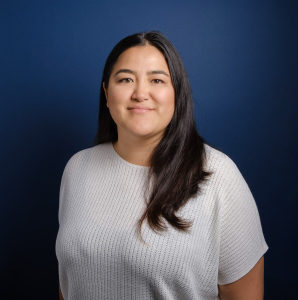
Ashley Alvarado, past president
Ashley Alvarado is the director of community engagement at Southern California Public Radio (KPCC + LAist). She works to develop strategies and opportunities to engage new and existing audiences across platforms. Ashley is focused on engagement and source development as a means to diversify the sourcing in news coverage and on shows, help enrich programming, and grow audience. Among her efforts is the engagement-driven, community-centered live storytelling series Unheard LA; chairing the organization’s diversity, equity, and inclusion task force and leading human-centered design.
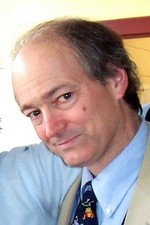
Bill Densmore, director
Bill Densmore, a consultant and researcher on the future and sustainability of journalism, is an expert on Internet information technologies and business models. He is a consulting fellow to the Donald W. Reynolds Journalism Institute (RJI) at the Missouri School of Journalism. He is author of the white paper, “From Paper to Persona.”
Densmore also serves as director/editor of the Media Giraffe Project at the University of Massachusetts-Amherst, and the New England News Forum.He also serves on the boards of the New England Newspaper & Press Association and Shires Media Partnership, Inc.
In a career spanning news writing, journalism, publishing and entrepreneurship, Densmore has founded two technology companies. Amherst, Mass.-based Clickshare Service Corp. provides user registration, authentication, content access control and transaction services to Internet web content sites and publishers. CircLabs Inc. is a development-stage startup incubated as part of Densmore’s Information Valet Project at RJI. It’s testing service concepts for news personalization and customization, including the InfoValet Circulate Discovery Service.
The Media Giraffe Project, launched in March, 2005, is an ongoing effort to find and spotlight individuals making sustainable, innovative use of media (old and new) to foster participatory democracy and community. Densmore holds a B.A. from the University of Massachusetts-Amherst in environmental policy and communications. A career journalist, Densmore has been an editor/writer for The Associated Press in Boston, Chicago and San Francisco and for trade publications in business, law, insurance and information-technology in Boston, Chicago and New York.
Peggy Holman, co-founder and treasurer
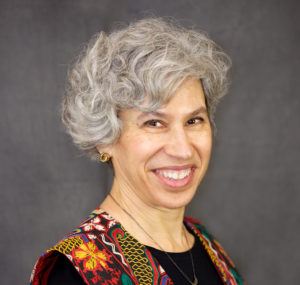
Seattle based author and consultant, Peggy Holman, has helped explore a nascent field of social technologies that engage “whole systems” of people from organizations and communities in creating their own future. She consults on strategies for enabling diverse groups to face complex issues by turning presentation into conversation and passivity into participation. In the second edition of The Change Handbook, she joins with her co-authors to profile sixty-one change processes. Her award-winning book, Engaging Emergence: Turning Upheaval into Opportunity, dives beneath these change methods to make visible deeper patterns, principles, and practices for change that can guide us through turbulent times.
Bringing her expertise in organization and community engagement, Holman joined three career journalists in founding Journalism That Matters to support the pioneers who are shaping the emerging news and information ecology.

Karen Magnuson, secretary
Karen Magnuson is an innovative leader and seasoned editor currently serving as an executive in residence for the Saunders College of Business at the Rochester Institute of Technology. She has spent 40 years working in journalism, most recently as executive editor of the Democrat and Chroniclein Rochester, NY, and state editor for the USA TODAY Network.
Magnuson joined the D&C in 1999 as managing editor and was promoted to executive editor a year later. In 2017, she took on the responsibility of supervising editors of USA TODAY Network newspapers in New York and Vermont. She left Jan. 2 through an early retirement program and is exploring options for a second career.
Under Magnuson’s leadership, the D&C adopted a digital-first mindset and experimented with new approaches in community engagement. She is a recipient of the national Robert G. McGruder Award for Diversity Leadership and continues to be an industry champion as co-chair of the Diversity Committee for the American Society of News Editors. She was elected to the board of ASNE in 2013.
Magnuson was also active for many years as a board member of Associated Press Media editors, an association of editors at AP member newspapers in the United States and Canada. She served as association president in 2007 and foundation board president in 2008.
She is a life-long learner who spent a few years taking night classes to earn a master’s degree in innovation management from RIT. She received the degree in 2012 and joined RIT’s Management Department Advisory Board in 2017. She is chair-elect. She’s also a member of the board of trustees for Alma College in Michigan, where she earned her bachelor’s degree.
Before she arrived in Rochester, her home since 1999, Magnuson toured the country serving as managing editor of the Wichita Eagle in Kansas, editor of the Valley Timesand Oxnard Press-Couriernewspapers in California, regional editor and educational services manager for the Daily Newsof Los Angeles, and bureau manager for United Press Internationalin Iowa, Illinois and Utah.
She lives in the Rochester suburb of Greece with her husband, Tod Myers, and their dog Treasure, a spoiled Shih Tzu too cute for words.
Lori Shontz, director
Lori Shontz is a journalism instructor at the School of Journalism and Communication at University of Oregon. She teaches reporting, writing and sports journalism, and she develops curriculum to help student journalists better engage with the communities they will cover.
She also is co-founder and co-director of Writing Central, a peer coaching center for communications writers, and faculty adviser for student chapters of the Society of Professional Journalists and the Association for Women in Sports Media. She runs a news bureau that covers track and field, and her students’ work has appeared in 37 publications, including The Miami Herald, the Arizona Republic and Runner’s World Online.
Her research interests include journalism education, writing instruction and the links between communities and journalism, with a focus on coverage of mass shootings.
She previously spent more than two decades in the newsroom, specializing in sports, women’s issues and higher education for The Miami Herald, the St. Louis Post-Dispatch, the Pittsburgh Post-Gazette and The Penn Stater alumni magazine. She graduated Phi Beta Kappa from Penn State in 1991 with a B.A. in English writing and received an M.Ed. in adult education from Penn State in 2013.

Mike Fancher, director emeritus
In 2008 Mike Fancher retired from The Seattle Times after 20 years as executive editor. During his tenure The Times won four Pulitzer Prizes and was a Pulitzer finalist 13 other times. A Seattle official is quoted as saying, “Under Mike, the paper was fearless about tackling subjects it thought were important to the community. There were a lot of people in the community who didn’t like that. But, at the same time, the paper was gutsy, and fearless in admitting when it made a mistake.”
Fancher devoted his 2008/2009 Donald W. Reynolds Journalism Institute Fellowship year to the question, “What is the Journalist’s Creed for the 21st Century?” His research explored how shifting elements, such as the relationship between journalists and the public, affect the values and principles of journalists today and in the future. Currently Fancher serves as an adviser to the Knight Commission and is a frequent speaker at industry, civic and academic gatherings. He is working on a book on the Journalist’s Creed in the 21st Century.
Fancher was also the Reynolds Visiting Chair in the Ethics of Entrepreneurial and Innovative Journalism at the Donald W. Reynolds School of Journalism at the University of Nevada, Reno.
He is still in the process of retiring.
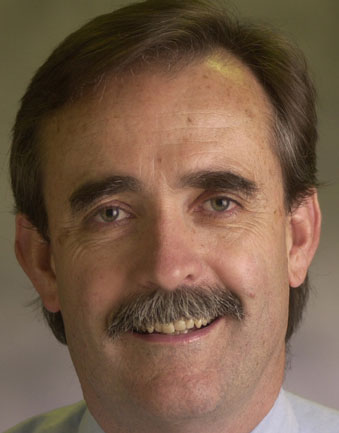
Chris Peck, co-founder and director emeritus
Associate Director, The Pyramid Peak Foundation, Memphis, Tenn. Chris Peck is a former president of both the Associated Press Managing Editors and the American Society of Newspaper Editors and former editor of The Commercial Appeal in Memphis where he oversaw all news and opinion operations and directed a staff of approximately 180 reporters, editors and photographers. Peck came to Memphis in 2003 after serving for one year as the first Belo Distinguished Chair of Journalism at Southern Methodist University in Dallas. Before that, he was editor of The Spokesman-Review, in Spokane, Wash. Under his direction, The Spokesman-Review was cited by Columbia Journalism Review as one of the 25 best papers in the United States.
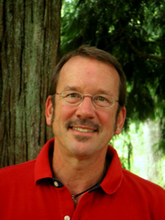
Stephen Silha, co-founder and director emeritus
Past president, Washington News Council, Seattle, Wash. Stephen Silha is a freelance writer, communications consultant, facilitator, futurist, and filmmaker. A co-founder of Journalism That Matters, Stephen was a reporter for the Christian Science Monitor and The Minneapolis Star before becoming communications director for the Charles Stewart Mott Foundation. He co-convened the first symposium on The Media and Philanthropy at the Chicago Tribune, and worked on the research project on community communications called Good News/Good Deeds: Citizen Effectiveness in the Age of Electronic Democracy.
Silha has worked with youth to get their voices in the media, and to facilitate youth-adult dialogues on Vashon Island, near Seattle, where he lives. He is currently making his first film, Big Joy, a documentary about the power of art and poetry to change lives, using the life and work of filmmaker/poet James Broughton as a lens.
In Memoriam

Cole Campbell, former editor of both the Norfolk (VA) Pilot, and the St. Louis Post-Dispatch, and dean of the Reynolds School of Journalism, University of Nevada, was essential in shaping Journalism that Matters. Along with Chris Peck, Stephen Silha, and Peggy Holman, he crafted our original white paper proposing a national conversation on journalism that matters, naming five challenges facing journalists in every community:
- The challenge of purpose
- The challenge of audience
- The challenge of craft
- The challenge of limits
- The challenge of joy
Cole died in an auto accident in January, 2007. We honor his contribution to the field of journalism and miss his wit and wisdom.